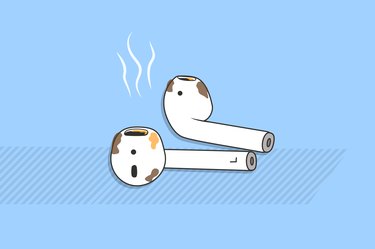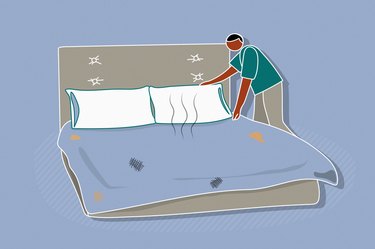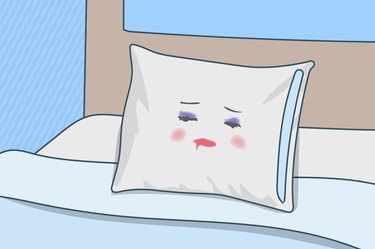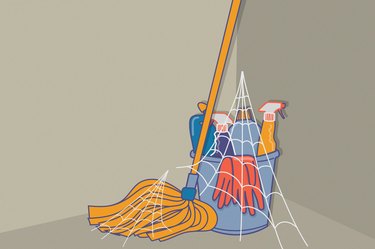
Psst, hey. You! Pull those earbuds out of your ears and take a look at them. Are they covered with wax and grimy buildup? Yup, thought so.
Chances are you use your earbuds or AirPods on a daily basis. But if you're like most, you've never bothered cleaning them, or maybe you did it once shortly after you got them, swearing that this time, you'd take better care of your electronic devices.
Video of the Day
Video of the Day
This is a big mistake.
Less-than-sparkly buds might not seem like a big deal. (They're not going in your mouth or anything!) But foregoing cleaning can actually set you up for some potential problems in the ear department. Here's what can happen — and the simple way to steer clear.
The Effects of Not Cleaning Your Earbuds
1. You Could Get an Infection
Your ears are home to a never-ending supply of brown sticky wax and natural oils. Every time you insert your earbuds, some of this gunk gets transferred to the devices.
Your earbuds, too, are picking up dirt and bacteria when they're not in your ears — whether they're sitting on your desk or buried at the bottom of your bag.
Simply put, you don't want to be putting this buildup back into your ears. "Bacteria on earbuds can potentially cause infection of the ear skin canal," explains Thomas Mazzoni, DO, an otolaryngologist with ENT and Allergy Associates.
This isn't just a potential risk. Wearing devices like earplugs or hearing aids that aren't properly cleaned is listed as one of the top factors that can increase the chance for developing bacterial or fungal ear infections, per Merck Manuals.
The chances of getting an infection are even higher if you use Q-tips to clean your ears, Dr. Mazzoni says. "They can abrade the ear canal and more easily allow bacteria to enter the skin." (And you thought all that wiping and swiping was being conscientious!)
2. It Could Eventually Contribute to Hearing Loss
Another possible downside of dirty earbuds? All that wax can block the earbud speakers, resulting in you needing to turn the volume ever higher. Over time, that can set the stage for hearing loss, says Dr. Mazzoni.
Even if the volume doesn't seem too loud, turning it up "can increase other frequencies potentially to a higher level that may initiate damage to the ear," he explains.
How to Clean Earbuds Safely
In an ideal world, you'd give your earbuds a quick clean every day, Dr. Mazzoni says. If that level of commitment seems way too high, aim for every few days or even once a week. Anything is better than never!
De-gunking doesn't have to be a major project.
"I would clean earbuds the same way I would instruct hearing aid patients to clean their devices," recommends Dr. Mazzoni. Dab a little bit of rubbing alcohol on a tissue or cloth and give the buds a gentle wipe. Don't use dripping wet cloths or chemical cleaners, recommends Johns Hopkins Medicine. The former can damage your earbuds; the latter might damage your ears.
If stubborn wax is caked onto the speaker (gross!), you'll need to gently scrape or scoop it out. A hearing aid cleaning brush with a wax pick is an ideal tool for the job, and you can get them for cheap (try this one from Amazon, for $6.99).
A dry toothbrush or a toothpick will also work in a pinch. Just avoid using too much pressure with the toothpick, or you might end up damaging the speaker.
So, How Bad Is It Really to Never Clean Your Earbuds?
Dirty earbuds won't kill you. But they can up your risk for a nasty ear infection and may make you prone to hearing loss over time.
So give your pods a good clean at the end of the day...or whenever you happen to remember. Your ears will thank you for it.
Is this an emergency? If you are experiencing serious medical symptoms, please see the National Library of Medicine’s list of signs you need emergency medical attention or call 911.



